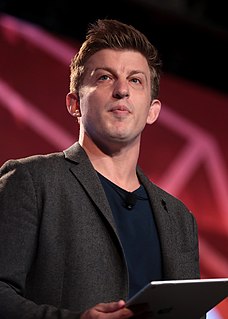A Quote by Tom Stoppard
It is easily and often overlooked that when Thomas Jefferson asserted that life, liberty and the pursuit of happiness were inalienable human rights, he did so on the ground that they had been endowed by God, our Creator.
Related Quotes
Thomas Jefferson understood the greater purpose of the liberty that our Founding Fathers sought during the creation of our Nation. Although it was against the British that the colonists fought for political rights, the true source of the rights of man was clearly stated in the Declaration of Independence. Jefferson wrote that all humans are endowed by their Creator with certain unalienable Rights . . . . It was self-evident to him that denying these rights was wrong and that he and others must struggle to win what was theirs.
When our founding fathers put their signatures on the Declaration of Independence, those 56 brave people, most of whom by the way were clergymen, they said that we had certain inalienable rights given to us by our creator, and among these life, liberty and the pursuit of happiness, life being one of them. I still believe that.
We hold these truths to be self-evident, that all men are created equal, that they are endowed by their Creator with certain inalienable rights, among these are life, liberty, and the pursuit of happiness, that to secure these rights governments are instituted among men. We...solemnly publish and declare, that these colonies are and of a right ought to be free and independent states...and for the support of this declaration, with a firm reliance on the protection of divine providence, we mutually pledge our lives, our fortunes, and our sacred honour.
It wouldn't take us long to discover the substance of that dream. It is found in those majestic words of the Declaration of Independence, words lifted to cosmic proportions: We hold these truths to be self-evident, that all men are created equal, that they are endowed by God, Creator, with certain inalienable Rights, that among these are Life, Liberty, and the pursuit of Happiness. This is a dream. It's a great dream.
We hold these truths to be self-evident: that all men are
created equal; that they are endowed by their Creator with certain
inalienable rights; that among these are life, and the right to
make that of another miserable by thrusting upon him an
incalculable quantity of acquaintances; liberty, particularly the
liberty to introduce persons to one another without first
ascertaining if they are not already acquainted as enemies; and
the pursuit of another's happiness with a running pack of
strangers.
July 4, 1776 was the historic day on which the representatives of three millions of people vocalized Concord, and Lexington, and Bunker Hill, which gave notice to the world that they proposed to establish an independent nation on the theory that all men are created equal, that they are endowed by their creator with certain inalienable rights, that among these are life, liberty, and the pursuit of happiness.
It was right then that I started thinking about Thomas Jefferson on the Declaration of Independence and the part about our right to life, liberty, and the pursuit of happiness. And I remember thinking how did he know to put the pursuit part in there? That maybe happiness is something that we can only pursue and maybe we can actually never have it. No matter what. How did he know that?
the right to marry whoever one wishes is an elementary human right ... Even political rights, like the right to vote, and nearly all other rights enumerated in the Constitution, are secondary to the inalienable human rights to 'life, liberty and the pursuit of happiness' proclaimed in the Declaration of Independence; and to this category the right to home and marriage unquestionably belongs.
What makes us exceptional - what makes us American - is our allegiance to an idea articulated in a declaration made more than two centuries ago: “We hold these truths to be self-evident, that all men are created equal; that they are endowed by their Creator with certain unalienable rights; that among these are life, liberty, and the pursuit of happiness.”
I believe all Americans are born with certain inalienable rights. As a child of God, I believe my rights are not derived from the constitution. My rights are not derived from any government. My rights are not denied by any majority. My rights are because I exist. They were given to me and each of my fellow citizens by our creator, and they represent the essence of human dignity.



































